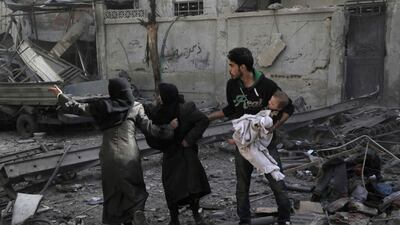Britain has urged the Assad regime and its backers to allow humanitarian and health workers to provide “desperately needed” help in Syria’s eastern Ghouta region.
In a strongly-worded statement, foreign secretary Boris Johnson and international development secretary Penny Mordaunt described eastern Ghouta as “hell on earth” and called the situation there “heart-breaking”.
The assault on the area, a collection of suburbs just outside Damascus, has been one of the most intense in Syria's seven-year-old war, killing more than 1,500 people in a relentless bombardment with war planes, shells and rockets in the past month by President Bashar Al Assad's forces.
“Appallingly we have seen this happen time and time again in the Syria conflict,” the two ministers said. “Humanitarian and health workers, including the heroic White Helmets, report that the regime is deliberately targeting them. Those who support the regime in carrying out these atrocities and vile murders have lost their moral compass entirely.”
_______________
Read more:
Syria: Assad edges forward as rebels leave Ghouta
Russia blamed for Syria air strike that killed 15 children
_______________
Mr Johnson and Ms Mordaunt said that it is critical to guarantee the safety and dignity of the population, including humanitarian and medical personnel, at all stages. “The UN is ready to provide assistance to these people, whether they choose to stay or leave,” they said.
“The regime and its backers must immediately implement UN Security Council Resolution 2401, allowing humanitarian agencies to provide the help that is so desperately needed and evacuate those who urgently need medical attention,” they added.
The statement added that evacuations from eastern Ghouta must be “safe, voluntary, and independently monitored”.
Tens of thousands of civilians have fled the region’s besieged, bomb-battered towns in recent weeks.
The ministers expressed concerns that those fleeing are vulnerable and risk being mistreated or abused by the regime, whether that means being detained, split up from their families, or simply vanishing.
“Whether civilians choose to stay or leave, they must be protected against attack and have access to basic supplies to survive,” they added.

